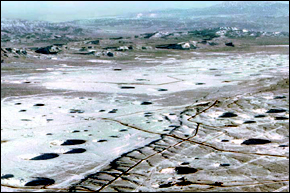The Stream, February 25: Toxic Clean-up
South Africa has pledged $168 million to clean the toxic water that threatens to spill out from derelict gold mines under Johannesburg, Reuters reports. It plans to immediately start building pumping, treatment and monitoring stations that would begin operations by March 2012, or just a few months before the acid water is expected to reach “environmentally critical levels.”
U.S. aid agencies are warning that North Korea is on the brink of a food crisis. A bitter winter has failed the wheat, barley and potato crops in the country, where rising global food prices are also taking a toll. As many people in the provinces are facing severe water shortages, North Korea has appealed to foreign governments for food aid, according to the Guardian. Meanwhile, the Institute for Agriculture and Trade Policy ponders whether famine will become the new norm globally, and The Economist maps out the biggest producers of genetically modified crops.
Xinhua reports on the disappearing glaciers in the Qilian Mountains between Qinghai Province and Gansu Province. The glaciers are melting faster than predicted, and threatening to disrupt the water supplies in downstream regions.
In other places, like Tajikistan, the warm and rainy winter is a boon. The high water levels in the country’s reservoirs have allowed the government to end the winter electricity rationing earlier this year. But this is hardly a solution to Tajikistan’s chronic energy shortages.
The Stream is a daily digest spotting global water trends. To get more water news, follow Circle of Blue on Twitter and sign up for our newsletter.
, a Bulgaria native, is a Chicago-based reporter for Circle of Blue. She co-writes The Stream, a daily digest of international water news trends.
Interests: Europe, China, Environmental Policy, International Security.




Leave a Reply
Want to join the discussion?Feel free to contribute!